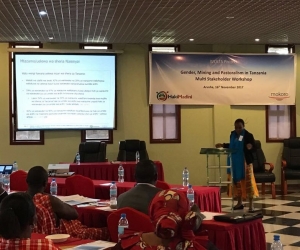WOLTS Team Hold Multi-Stakeholder Workshop on Gender, Mining and Pastoralism in Tanzania
30 November 2017
On Thursday 16 November 2017 members of the WOLTS team hosted a ‘Multi-Stakeholder Workshop on Gender, Mining and Pastoralism in Tanzania’ in Arusha, Tanzania. For the past 18 months Mokoro and HakiMadini have been working together in Tanzania on a long-term practical and action-oriented strategic research project on women’s land tenure security – the WOLTS Project. The team have carried out in-depth and rigorous research in two pastoralist communities affected by mining in Simanjiro and Longido districts (Mundarara and Naisinyai villages), looking at the intersection of gender and land relations in different pastoralist contexts and developing a methodology for continuing community engagement. This has involved multiple site visits and different research methods and techniques to triangulate and validate data.
The WOLTS team presented findings from the research in both study communities at the November workshop, which was chaired by Mr Amani Mhinda, Executive Director of HakiMadini. Participants included community representatives, local- and district-level government officials, as well as representatives from civil society, the private sector and from the Government of Tanzania’s Land Tenure Support Programme. Mokoro and HakiMadini were delighted to have Mr G. F. Daqarro, the District Commissioner of Arusha District, officially open the workshop, with Mr E. Senka, representing the Arusha Zonal Mining Office, giving the closing remarks. The WOLTS team have benefited from a productive collaboration at all levels of government and with a wide range of other local- and national-level stakeholders since the start of the research, and they were very pleased to be able to share initial findings and obtain feedback on possible next steps. The workshop included an introduction presentation on the WOLTS research by Mokoro’s Dr Elizabeth Daley, WOLTS Team Leader, as well as presentations on the findings from both communities by Ms J. Ndakaru, HakiMadini’s Gender Officer, and Mr. E. Kereri, also from HakiMadini. Lively discussions and working group sessions followed and the research was highly appreciated by all.



